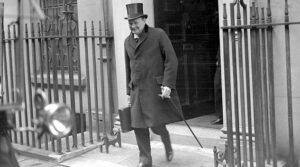
Finest Hour Extras
Churchill’s Speeches and Writings Follow Cicero’s Principles

A marble statue in front of the Old Palace of Justice in Rome of Marcus Tullius Cicero, who was known as one of the greatest orator's of the Ancient empire.
June 22, 2018
Introduction
The 2017 movie the Darkest Hour focuses on the Nazi war on Western Europe in May/June 1940.[2] In the film, Prime Minister Winston Churchill is portrayed as a wordsmith and orator that uses his powers of persuasion to move British policy away from appeasing Hitler and toward engaging him militarily.[3] The Prime Minister is shown dictating drafts and redrafts of speeches on the Nazi threat and related to his personal secretary, Ms. Elizabeth Layton [4]–rarely sitting at his desk (e.g., pacing in his bare feet, laying on a bed, or taking a bath), often making last minute changes.
Further, in the movie, Churchill asks Anthony Eden, his Foreign Secretary, what he thinks of his draft speech to address the nation on the war. Eden cautions Churchill against declaring that we are winning the war when we are not. Churchill replies but I want to imbue them with confidence, to which Eden says you asked for my opinion. Eden’s use of the words “caution against” immediately prompts the Prime Minister to search for a Cicero book presumably to resolve the dilemma.
Moreover, Churchill wrote an acclaimed six-volume history of the Second World War and also an acclaimed four-volume history of the First World War. In 1959, he published a one-volume abridged version of WWII, Memoirs of the Second World War.

2024 International Churchill Conference
Churchill’s historical writings and public speeches earned him the Nobel Prize for Literature in 1953.
In this short piece, I first introduce Cicero, in brief. Then I cover some of Cicero’s rhetoric principles [5] along with Churchill’s application of them.
Cicero, in brief [6]
Marcus Tullius Cicero (106 BC – 43 BC) was a Roman politician and lawyer, who served as consul in the year 63 BC. He came from a wealthy family of the Roman equestrian order and is considered one of Rome’s greatest orators and prose stylists.
On liberty, Cicero inspired the Founding Fathers of the United States and the French Revolution. For example, Thomas Jefferson names Cicero as one of a handful of major figures who contributed to American’s understanding of its revolution and to his draft of the Declaration of Independence.
On religion, scholars note Cicero’s influence on the rebirth of religious toleration in the 17th century.
And on writing and speaking, Cicero’s influence on the Latin language was so immense that the subsequent history of prose–not only in Latin but also in European languages up to the 19th century–was said to be either a reaction against or a return to his style. According to Michael Grant, English classicist and author of numerous popular books on ancient history, the influence of Cicero on European literature and ideas greatly exceeds that of any other prose writer in any language.
Churchill’s Use of Cicero’s Principles
Here I present Cases A-I to illustrate how some of Cicero’s rhetoric principles guided Churchill in his public speeches and historical writings.
CASE A: PRINCIPLE OF REDUNDANCY
Cicero’s Principle of Redundancy: Takes many forms and is very common. For example, repetition of an idea; often expressed in a doubling of words or phrases (geminatio) to satisfy the needs of rhythm and to please the ear.
Winston Churchill’s use of Redundancy: “We shall fight on the beaches” speech to the House of Commons on June 4, 1940:
…. We shall not flag nor fail. We shall go on to the end. We shall fight in France and on the seas and oceans; we shall fight with growing confidence and growing strength in the air. We shall defend our island whatever the cost may be; we shall fight on beaches, landing grounds, in fields, in streets and on the hills. We shall never surrender…carry on the struggle, until, in Gods good time, the New World, with all it power and might, steps forth to the rescue and the liberation of the Old.
CASE B: PRINCIPLE OF CONGERIES
Cicero’s Principle of Congeries: The piling up of words of related or similar meaning, to enhance or augment the force of language: “We will find that not a single hour was free from robbery, criminality, cruelty and wickedness.”
Winston Churchill’s use of Congeries: “Iron Curtain” speech, Fulton, Missouri, March 5. 1946:[7]
… It is necessary that constancy of mind, persistency of purpose, and the grand simplicity of decision shall rule and guide the conduct of the English-speaking peoples in war and peace… From Stettin in the Baltic to Trieste in the Adriatic an “iron curtain“ has descended across the Continent…
CASE C: PRINCIPLE OF ALLITERATION
Cicero’s Principle of Alliteration: Repetition of consonantal sounds: pecuniam plurimam posse – “money rules supreme”.
Winston Churchill’s use of Alliteration: General comment; Humes, James, “Observations and Opinions,” Wit & Wisdom of Winston Churchill, 1994:
Fatuity and fickleness, which though devoid of guile, are not devoid of guilt.
CASE D: PRINCIPLE OF AMPLIFICATION
Cicero’s Principle of Amplification: Use of succession of striking terms – strong word followed by still stronger one. Sentence builds up to a climax: “not a thief but a plunderer…”
Winston Churchill’s use of Amplification: “Locusts” speech. As a “back bencher,” Churchill condemned the Conservative Party government for failing to rearm (1937, House of Commons):
The government cannot make up their minds, or they cannot get the prime Minister to make up his mind…decided only to be undecided, resolved to be irresolute, adamant for drift, solid for fluidity, all-powerful to be impotent. So, we go on …for the locusts to eat.
CASE E: PRINCIPLE OF ANTITHESIS
Cicero’s Principle of Antithesis: Neat, verbal contrast, often expressed in exactly parallel phrases: “The point where they were more powerfully influenced by loathing for your licentiousness than by the awe in which they held the office of legate.”
Churchill’s use of Antithesis: “A Sturdy Horse” is Churchill’s last public speech to his Woodford England constituency, 1959:
Some Socialists see private enterprise as a tiger—a predatory animal to be shot. Others see it as an old cow to be milked. But we Conservatives see it as a sturdy horse that pulls along our economy.
CASE F: PRINCIPLE OF ARGUMENTATION
Cicero’s Principle of Argumentation: Arguments to make a point: “Well, then, you experienced his treachery when he betook himself to your enemies… and proved unwilling… ”
Winston Churchill’s use of Argumentation: Reforming the Royal Navy; Humes, James, “Escapades and Encounters”, Wit & Wisdom of Winston Churchill, 1994:
In 1912, Churchill became the youngest First Lord of the Admiralty in British history. And he quickly set out to reform the Royal Navy, including early retirement for many mossback Admirals. But one such admiral said to Churchill: “You are scuttling the traditions of the Royal Navy!” Churchill retorted:
What the traditions of the Royal Navy are—rum, sodomy, and the cat-o’-nine-tail lash.
CASE G: PRINCIPLE OF ASSONANCE
Cicero’s Principle of Assonance: Like alliteration, the repetition of sounds for the purpose of euphony or pleasing of the ear: sine labore, sine molestia, sine impensa, etiam sine patrono… “without toil or without trouble or without expense or even without the services of an advocate.”
Winston Churchill’s use of Assonance: Describes Field Marshall Viscount Bernard “Monty” Montgomery; Humes, James, “Saint and Sinners,”, Wit & Wisdom of Winston Churchill, 1994:
In defeat, indomitable. In advance, invincible. In victory, insufferable.
CASE H: PRINCIPLE OF COMPARISONS
Cicero’s Principle of Comparisons: The drawing of comparisons between situations, e.g. the citing of a lesser form of a crime to heighten the gravity of the form in question: “I am not going to say this or that statue was removed from there: I say that you, Verres, left not one statue in Aspendus….”
Winston Churchill’s use of Comparisons: Draws a comparison between Viscount Halifax (British Foreign Secretary, 1939-40) and others; Humes, James, “Saint and Sinners,”, Wit & Wisdom of Winston Churchill, 1994:
Halifax’s virtues have done more harm than the vices of hundreds of other people.
CASE I: PRINCIPLE OF LITOTES
Cicero’s Principle of Litotes: Lends emphasis to a point by means of understatement. “She replied in a manner that, for a prostitute, was not ungracious.”
Winston Churchill’s use of Litotes: Importance of the King’s First Minister, 1943; Humes, James, “Observations and Opinions”, Wit & Wisdom of Winston Churchill, 1994:
I have not become the King’s First Minister in order to preside over the liquidation of the British Empire.
Author Larry Schwartz is a retired econometrician who is a great admirer of Winston Churchill since seeing the film Darkest Hour.
—
[2] The movie took some liberties with several events and people but seemed to capture the sense of Churchill; see
http://www.historyvshollywood.com/reelfaces/darkest-hour/
[3] Just after Churchill convinces the entire House of Commons to fight the Nazis, the movie took liberty showing Viscount Halifax saying the following “He mobilized the English language and sent it into battle.” Actually, Edward R. Murrow said this first in 1954. Also, in 1963, president John F. Kennedy used that line to confer Sir Winston Churchill with an honorary U.S. citizenship.
[4] The movie also took liberty portraying Elizabeth Layton as Winston Churchill’s personal secretary in 1940; actually, Ms. Layton was his personal secretary between 1941 and 1945 (she cried when Churchill was not reelected as Prime Minister in 1945). In 1958, Ms. Elizabeth Layton Nel wrote a book about those secretarial experiences, “Mr. Churchill’s Secretary”; after going out of print, a new edition came out, “Winston Churchill By His Personal Secretary Elizabeth Nel,” completed shortly before her death in 2007.
[5]For a full enumeration of Cicero’s principles of oratory and prose, see http://www.classicalresourcecentre.com/rhetoric.htm
[6] https://en.wikipedia.org/wiki/Cicero
[7] Curiously, the “iron curtain” line was not in the advanced releases of the speech to the press offices around the world. It was later added during the train ride to the Westminster College in Fulton Missouri. Another example of Churchill wordsmithing his speeches up until the very last moment. Reported in Humes, James C., The Wit and Wisdom of Winston Churchill,1994.
Subscribe
WANT MORE?
Get the Churchill Bulletin delivered to your inbox once a month.



